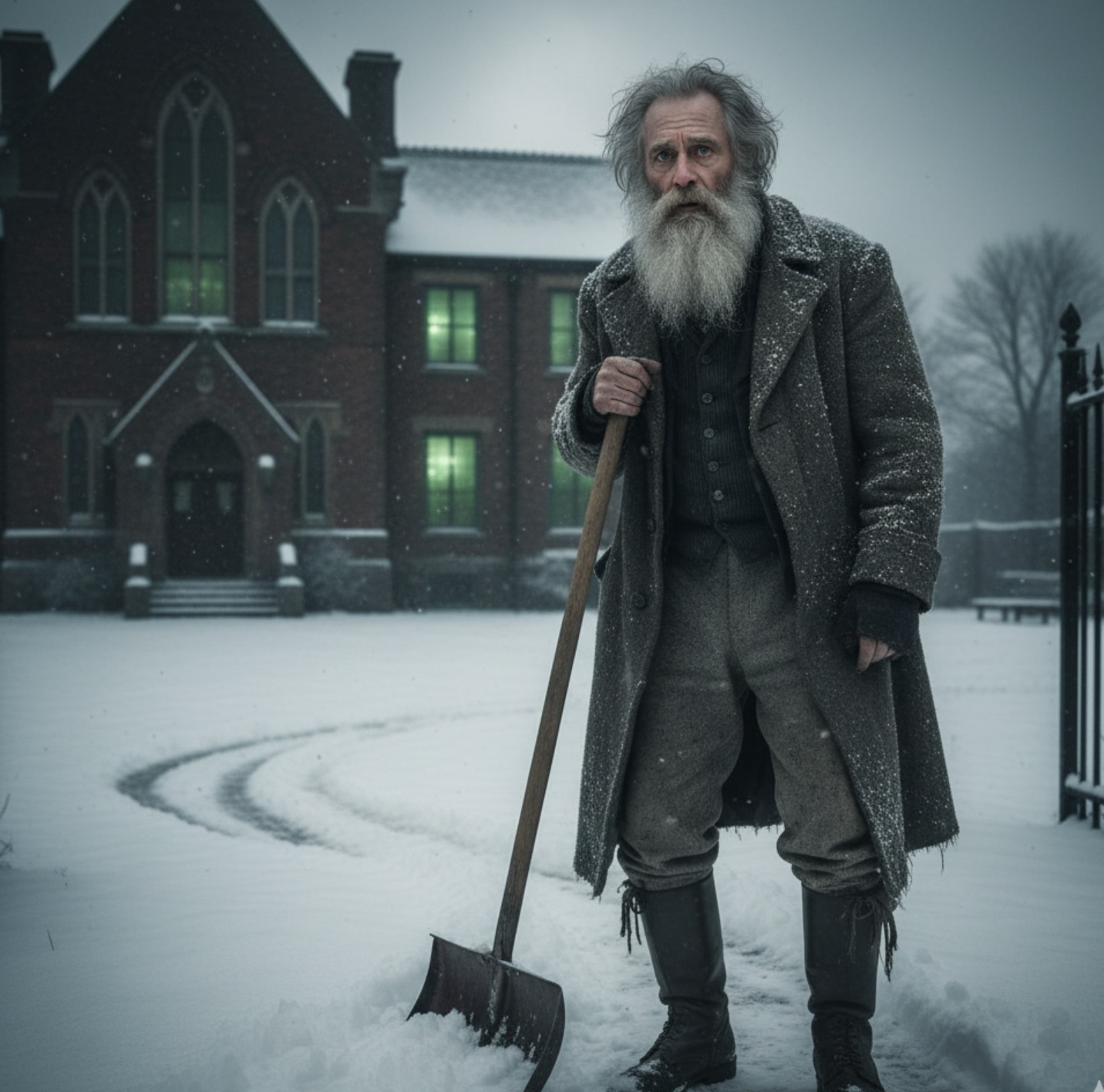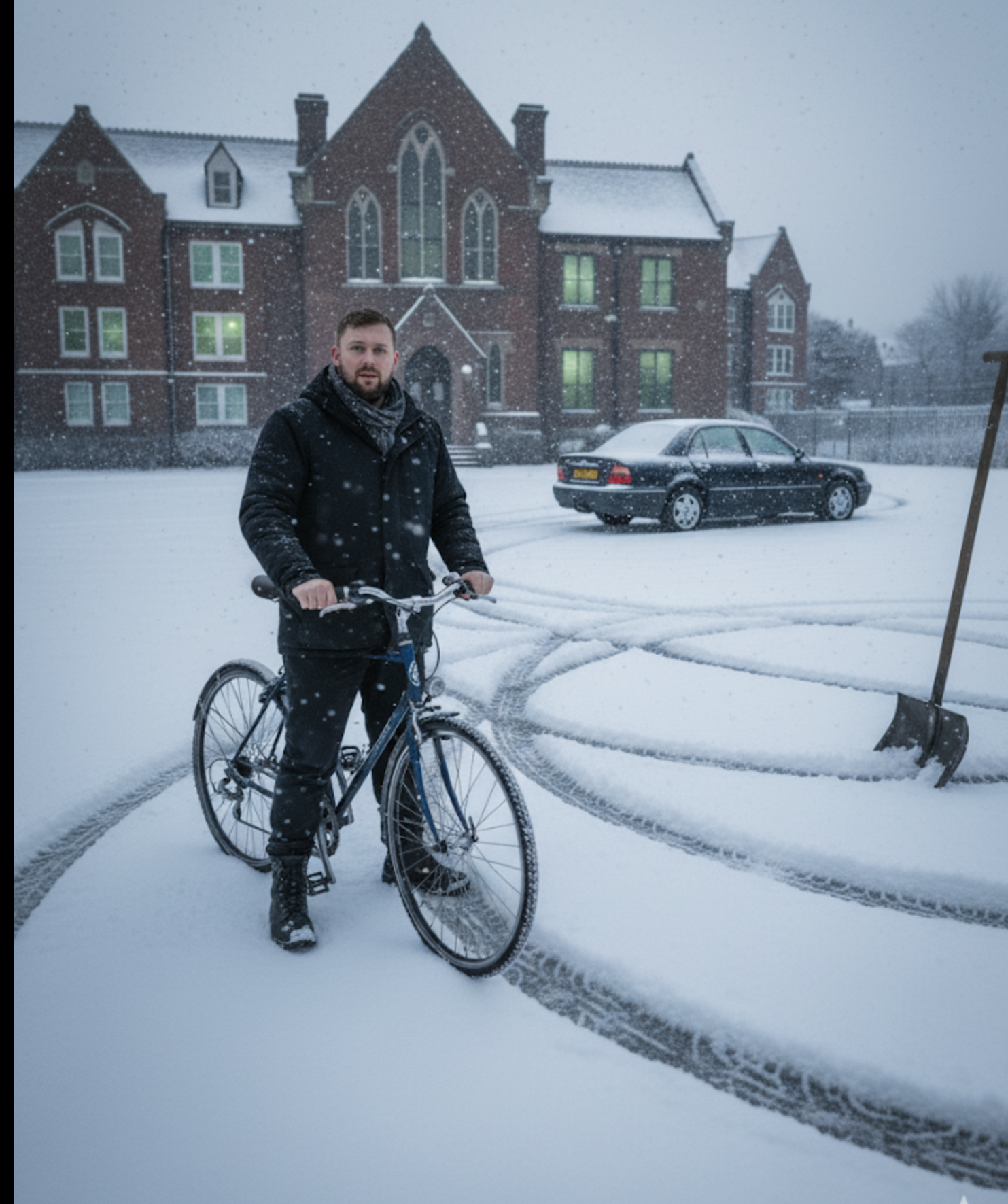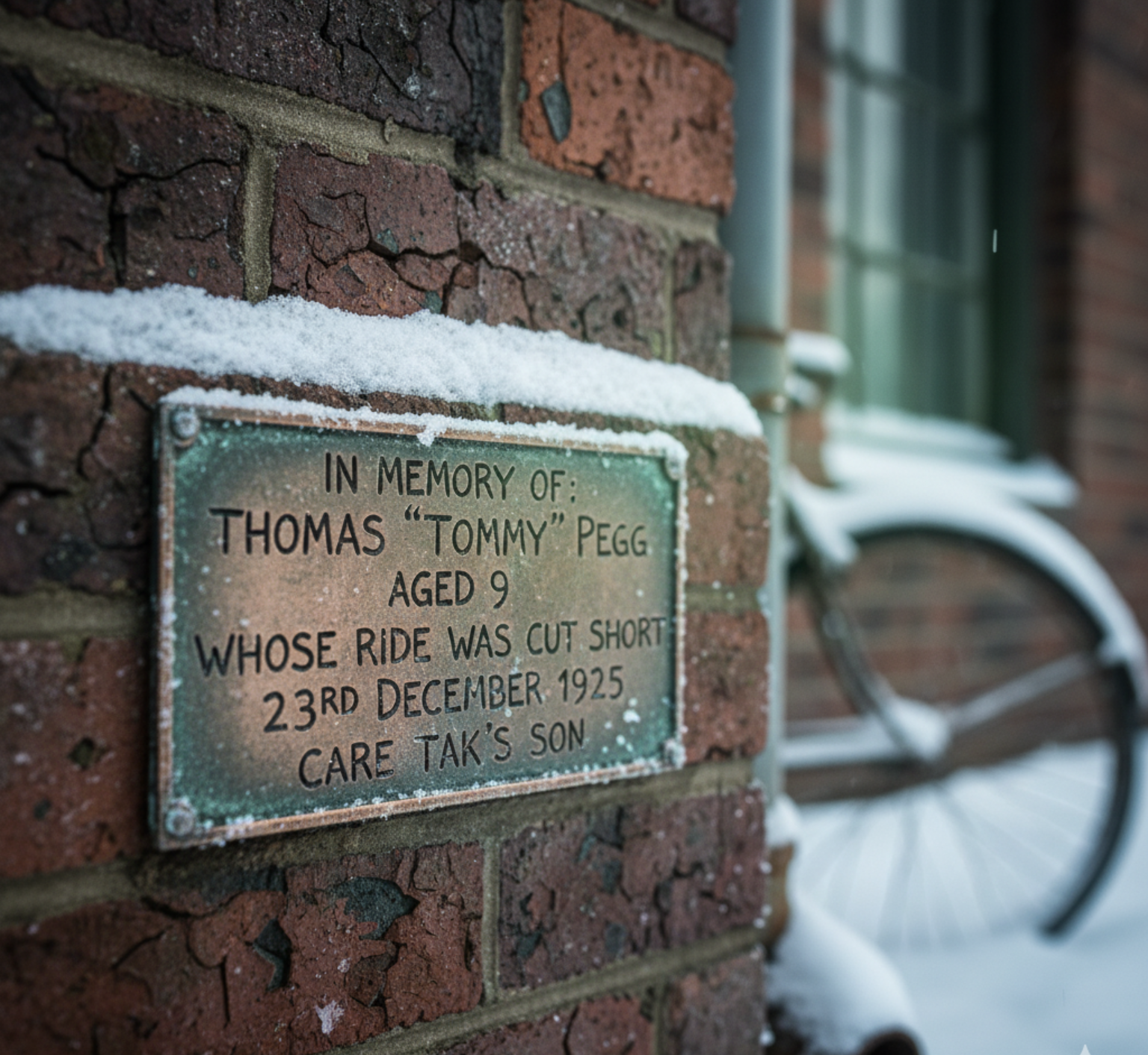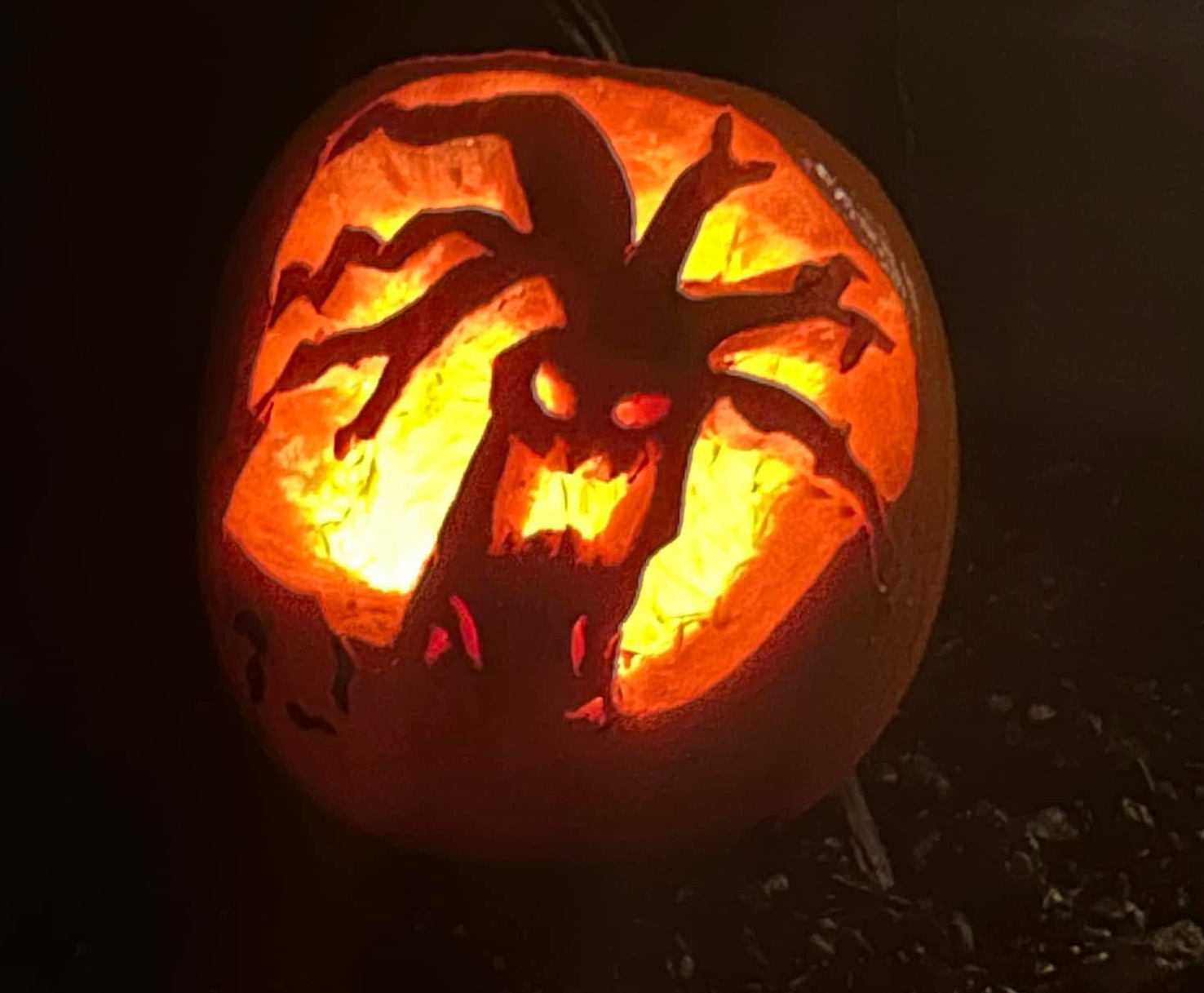Prologue:
You are about to embark on a journey, not just across time and snow, but into the chilling realms of what lingers. A place where the calendar can be bent, where seasons merge, and a single, forgotten lesson can echo through a hundred years.
Most folks wait for spectral tales on cold autumn nights, gathered by the pumpkin's glow. But I, always try and write a ghost story for Christmas. And though the leaves outside may still cling to October's gold, for this Halloween treat, consider the air crisp with frost, the ground blanketed in white, and the scent of pine needles carried on a sharp winter wind. Treat it as if it is a snowy Christmas time.
In this story, we follow Craig. A man of routine, of earthly concerns, facing a mundane task on what he believes is an ordinary December morning. But sometimes, routine can be a thin veil, easily torn by the threads of the past. Sometimes, the most ordinary settings harbour the most extraordinary and terrifying truths.
For Craig has stepped into a landscape where the lesson is eternal, the students are silent, and the price of an unfinished ride... is everything. He has entered a very specific kind of midwinter. He has entered...
...The Bicycle of Christmas Past.
The morning air bit at Craig’s face, sharp and sudden. He tightened the laces of his thermal boots, the leather already stiff with cold. “Blimey, snow,” he muttered, glancing at the white layer muffling his driveway. “And I have to teach those whipper-snappers how to ride a bike all day, two days before Christmas.” The weather was a sick joke; months of scorching drought had cracked the tarmac, and now, without warning, the world was cast in a pre-Christmas freeze. "Global warming," he thought, with a sigh of resignation.
He wrestled his car door open; the sound of the ice seal cracking was a groan of protest in the quiet morning. The engine, thankfully, roared to life immediately. “Brilliant. It won’t be so bad if I can get the car there and back without any bother.”
The drive to the school was slow, the roads slick and unfamiliar under the sudden frost. The radio was playing carols for Christmas “in the bleak midwinter, frosty wind made moan” Craig hummed along with the tune saying adding “you’re not wrong there mate” . When Craig finally pulled up to the schools’ main gate, he saw a single, hunched figure laboriously shovelling snow from the car park entrance. It was the school caretaker, but something about the man seemed subtly wrong.

Craig stepped out, the squeak of new snow under his boots loud in the silence. He approached the caretaker, who paused his work, leaning heavily on the wooden handle of his shovel. The man’s clothes were the first thing Craig noticed: drab, heavy wool, seemingly untouched by modern fabrics. His beard and hair were thick and dishevelled, giving him the appearance of a grizzled woodsman rather than a school janitor.
"Morning," Craig said, pulling his collar high. "Think it's going to be set for a while, this weather. I've seen it before."
The caretaker didn't look up, his breath clouding the air. "Aye. Been seeing it for longer than you know," the man rasped, his voice as dry as old leaves. "It’s the dark time."
Craig shrugged off the odd reply and walked to the boot of his car. "Well, better late than never," he said, popping the boot’s latch. As he reached in to grab his own demo bicycle, he added, "Though I could do without teaching cycling in a blizzard. One hundred percent."
He heaved the bike out, the metal cold on his gloved hands, and slammed the boot shut.
When he turned back to offer a final farewell, the caretaker was gone.
Craig stood there for a long moment, the shovel left upright, half-buried in a snowdrift. There was no sound of footsteps, no retreating figure disappearing around the corner. The silence of the school car park was absolute.
“Oh, well. Best get on,” he muttered, shaking off the sudden chill, though he couldn't quite shake the feeling of being watched. He wheeled his cycle toward the schoolyard and stood astride his bike to check his brakes and looked a the strange tracks in the snow below him.

The clock on the main school building showed 8:39. His class should have been lining up already, excited and noisy. Yet, the entire schoolyard was empty. Not a single child, no other teacher, and not even a light on inside the ground floor windows.
Had I got it wrong? he thought, looking at his watch, a creeping sense of dread replacing the earlier annoyance. Was it the wrong date? Was the school closed?
He glanced back at the gate where the silent, ancient caretaker had stood. It was only then that he realized something truly unsettling: the caretaker had been shoveling the snow, yes, but the prints he had cleared were not new. They were old, hard-packed marks left by a single bicycle tyre, tracing a lonely, circular route around the abandoned, snow-dusted grounds.
Craig was alone, standing at the edge of a profoundly cold silence, with a strange feeling that his bicycle training was less about teaching a skill, and more about fulfilling a centuries-old commitment to an empty school on the darkest day of the year.
Craig stood at the edge of the schoolyard, the silence pressing in on him, cold and thick as grave dirt. The snow had started falling again—not heavy flakes, but a fine, stinging powder that spiraled down from the iron-grey sky. He looked again at the gate. The caretaker’s shovel lay abandoned, and the only evidence of movement were the two parallel tyre tracks worn into the compacted snow—a lonely loop, as if someone had been riding in slow, endless circles for years.
"Wrong date," Craig said, trying to rationalise the empty school, the spectral caretaker. "It must be the wrong date."
He pulled out his phone. No reception. He glanced at the school sign, half-covered in ice. The familiar name, St. Jude’s Preparatory, was visible, but the carved wooden plaque listing the term dates had faded into illegibility.
He wheeled his bicycle toward the entrance, deciding he’d wait ten minutes, just in case. He leaned the bike against a frosted drainpipe and stamped his feet to restore circulation. As he did so, his eyes fell upon a small, metal plaque set into the brickwork near the bicycle sheds.
It wasn't a standard plaque. It was old, tarnished, and etched with uneven capital letters that looked carved by hand:

Craig recoiled, the cold seeping deeper than just his boots. December 23rd. That was today. 1925. A hundred years ago. And the word "CARE TAK SON" was separated by a misplaced space, as if hurriedly corrected by a distraught father.
He looked back at the driveway, imagining the drab figure with the disheveled beard. The caretaker hadn't been shovelling freshly fallen snow; he had been clearing the ground around a hundred-year-old memory.
A distant, faint sound reached Craig’s ears—a tiny, metallic whir, like a poorly-oiled chain. It was followed by a nervous, high-pitched giggle.
Craig slowly turned his head toward the deep shadow cast by the main building. Nothing. But the giggling came again, closer this time, accompanied by the distinct, unsteady tinkle of a bicycle bell.
He pushed off the wall and grabbed his own bike, his heart hammering against his ribs. He had to go. This wasn't just a closed school; it was an anniversary, a wake.
As he turned to sprint for the gate, the faint noise became suddenly loud and clear—the screech of metal brakes, the harsh, rhythmic clatter of a falling bicycle, and then a soft, final thud in the snow, right in the centre of the yard.
Craig didn't wait. He threw his leg over his bike and pedalled wildly toward the gate. He reached the exit, spinning his wheels on the slick, unshovelled snow, when a small, cold voice—barely a whisper—came from directly behind him:
"Mister. You have to finish the lesson."
He spun around, heart ready to leap out of his mouth. Standing just feet away was a boy, no older than nine, wearing clothes that looked like a faded photograph: thick wool trousers, a flat cap, and short, patched coat. His face was pale, his eyes wide, and his lips blue with cold.
"They won't let us go inside, see," the boy said, pointing a skeletal finger at the school doors, which now seemed to be glowing with a faint, greenish light. "The caretaker... my father... he says we have to learn to stop properly. He says if we don't master the brakes, the ride never ends."
The boy extended his hand. In his palm rested a small, tarnished, copper bicycle bell.
"You're late, Mister," the boy whispered, his eyes locking on Craig's. "Now, SHOW ME HOW TO STOP ."
As the boy spoke, the greenish light from the school windows intensified, and out of the deep shadows of the bicycle sheds, a silent, invisible parade of bicycles slowly began to circle the yard, their tyres leaving new, crisp tracks in the fresh snow, their ghostly riders all clad in drab, 1925 wool. Every single one of them, Craig realised with a sickening lurch, was nine years old.
He realised that he wasn’t here for a lesson. They were waiting for someone, him, the new Caretaker, to finally teach them how to stop riding…..forever.
Chosen Poem
By Christina Rossetti (1872)
(Craig was humming this during his drive to the school)
In the bleak midwinter, frosty wind made moan,
Earth stood hard as iron, water like a stone;
Snow had fallen, snow on snow, snow on snow,
In the bleak midwinter, long ago.
Happy Halloween

